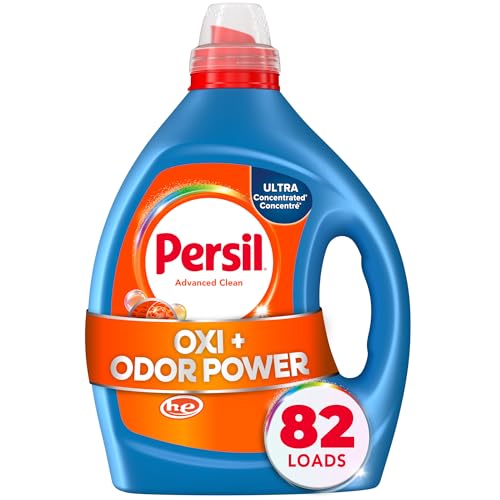




Have you ever noticed that sometimes your clothes come out of the washing machine with a strange and unpleasant smell? This can be quite frustrating, especially when you’ve just spent time and effort washing them. But why does this happen?
One possible reason for this unpleasant smell is the presence of bacteria and other microorganisms on your clothes. Even though you are washing your clothes with detergent and water, these microorganisms can still remain on the fabric. Over time, they can multiply and cause a foul odor.
Another potential cause of smelly clothes is the buildup of detergent residue. If you are using too much detergent or not rinsing your clothes thoroughly, the excess soap can cling to the fabric and create an unpleasant smell. Additionally, fabric softeners and dryer sheets can also leave behind residue that contributes to the odor.
Furthermore, the type of fabric and the washing machine itself can also play a role in causing smelly clothes. Some fabrics are more prone to trapping odors, such as synthetic materials like polyester. On the other hand, front-loading washing machines are known to retain more water and therefore can create a breeding ground for bacteria and mold, resulting in smelly clothes.
It is important to note that smelly clothes are not just an inconvenience; they can also be a sign of a more serious problem. If your clothes consistently come out of the washing machine with a foul smell, it could be an indicator of mold or bacteria growth in your washing machine or drainage system. In this case, it is crucial to clean and maintain your washing machine properly to avoid any health risks.
In conclusion, there are several reasons why clothes may come out of the washing machine smelling unpleasant. Bacteria and other microorganisms, detergent residue, the type of fabric, and the washing machine itself can all contribute to this issue. To prevent smelly clothes, it is important to properly clean and maintain your washing machine, use the right amount of detergent, and ensure thorough rinsing of your clothes.
Reasons for Smelly Clothes After Washing
It can be frustrating when clothes come out of the washing machine with an unpleasant smell. There are several reasons why this might happen, including:
1. Build-up of Bacteria
Bacteria can build up in the washing machine over time, especially in areas like the rubber seal and detergent drawer. When clothes are washed, the bacteria can transfer onto them, causing an unpleasant smell.
2. Insufficient Detergent

If the detergent used is not strong enough or if too little detergent is used, it may not effectively remove dirt and odours from the clothes. As a result, the clothes may come out of the machine smelling less than fresh.
3. Overloading the Machine
Overloading the washing machine can prevent clothes from being properly agitated and rinsed. This can lead to a build-up of dirt and grime, which can cause a lingering smell on the clothes.
4. Not Drying Properly
If clothes are not dried properly after washing, they can develop a musty smell. This can happen if clothes are left in the machine for too long before being transferred to the dryer or if they are not dried thoroughly.
5. Using Cold Water
Cold water may not be as effective at removing odours as hot water. If clothes are washed in cold water, particularly if they are heavily soiled or have strong odours, they may come out of the machine still smelling unpleasant.
6. Infrequent Machine Cleaning
If the washing machine is not regularly cleaned, residues from detergent and fabric softener can build up. This can lead to a stale smell on the clothes. It is important to clean the washing machine regularly to prevent this from happening.
7. Poor Ventilation
If the laundry area does not have proper ventilation, moisture can become trapped, leading to a musty smell on clothes. Ensuring adequate airflow and ventilation can help prevent this issue.
By addressing these common issues, it is possible to eliminate the unpleasant smell from clothes when they come out of the washing machine.
Residual Bacteria and Germs
One of the main reasons why clothes can be smelly when they come out of the washing machine is due to residual bacteria and germs. Despite the fact that we use soap and water to clean our clothes, sometimes not all bacteria and germs are completely eliminated during the washing process.
Residual bacteria and germs can come from various sources such as sweat, body oils, dirt, and other organic matter that may be present on the clothes. These microorganisms can survive and thrive in damp environments, making the inside of a washing machine an ideal breeding ground for them.
Even though detergents and high water temperatures can kill a significant portion of bacteria and germs, some of them may still survive and remain on the clothes. This can result in unpleasant odors even after the clothes have been washed.
Furthermore, bacteria and germs can also transfer from one garment to another during the washing cycle, especially in cases where contaminated items are mixed with clean ones. This cross-contamination can lead to the spread of odors among different clothes.
To minimize the presence of residual bacteria and germs on your clothes, it is recommended to follow some best practices:
- Use an appropriate amount of detergent according to the load size and level of dirtiness.
- Choose a detergent that contains antibacterial properties, as it can help eliminate more bacteria and germs.
- Wash clothes at high temperatures when possible, as heat can effectively kill microorganisms.
- Avoid overloading the washing machine, as it can prevent proper agitation and reduce the effectiveness of cleaning.
- Regularly clean and maintain your washing machine to prevent the buildup of bacteria and germs inside.
By following these tips, you can reduce the presence of residual bacteria and germs on your clothes and minimize any unpleasant odors that may occur after washing.
Mold and Mildew Growth
Mold and mildew are types of fungi that can grow on moist surfaces, including clothing. They thrive in dark, damp environments and can easily take hold in the warm, humid conditions inside a washing machine.
When clothes are left sitting in the washing machine for too long after the cycle has finished, they can become a breeding ground for mold and mildew. This is especially true if the machine is not properly ventilated or if the clothes are not dried completely before being stored.
The presence of mold and mildew can cause clothes to develop a musty or sour odor. These fungi can also leave behind stains or discoloration on the fabric, making the clothes look dirty or discolored even after they have been washed.
To prevent mold and mildew growth in your washing machine and on your clothes, it is important to take certain precautions:
- Make sure to remove your clothes promptly after the washing cycle is finished. Leaving them sitting in the machine for an extended period of time can create a damp environment that is ideal for mold and mildew growth.
- Allow your washing machine to fully air dry between cycles. This can help prevent the buildup of moisture and reduce the risk of mold and mildew growth.
- Regularly clean your washing machine, paying close attention to areas that can trap moisture, such as the rubber seal around the door. Use a mixture of vinegar and water or a commercial washing machine cleaner to remove any mold or mildew buildup.
- If you notice a musty odor coming from your washing machine or clothes, consider running an empty cycle with hot water and a cup of white vinegar to help eliminate any lingering odors.
By following these tips and being proactive in preventing mold and mildew growth, you can ensure that your clothes come out of the washing machine smelling fresh and clean.
Inadequate Detergent Usage
One of the common reasons why clothes may come out smelling bad even after washing is inadequate detergent usage. Using too little detergent can result in ineffective cleaning, leaving behind dirt, body oils, and bacteria that can cause odor.
When clothes are dirty, they require an adequate amount of detergent to break down and remove stains, dirt particles, and bacteria. Failure to use enough detergent can lead to insufficient cleaning and the retention of odor-causing substances.
It’s important to follow the manufacturer’s instructions and measure the appropriate amount of detergent based on the load size and level of dirtiness. Using too much detergent, on the other hand, can also lead to unpleasant odors as it can leave behind residue that accumulates on clothing fibers.
Additionally, using the wrong type of detergent for the specific fabrics or garments being washed can also contribute to smelly clothes. Some fabrics, such as synthetic materials, may require special detergents or additives to effectively remove odor-causing bacteria.
To ensure that clothes come out smelling fresh and clean after each wash, it’s essential to use the correct amount of detergent and choose a detergent that is suitable for the fabrics being washed. Regularly cleaning the washing machine itself can also help prevent odor buildup and ensure that clothes are thoroughly cleaned.
Washing Machine Maintenance
Maintaining your washing machine is essential to ensure clean and fresh-smelling clothes every time. Regular maintenance not only helps prevent smelly clothes but also extends the life of your machine.
1. Clean the drum and detergent drawer
Over time, dirt, detergent residue, and fabric softener can build up in the drum and detergent drawer, leading to unpleasant smells. Regularly clean these areas to keep your washing machine fresh. Wipe down the drum and detergent drawer with a damp cloth, and remove any debris or residue.
2. Check for blockages
Blocked hoses or filters can cause water to become stagnant, leading to foul smells. Check the drain hose, pump filter, and any other accessible parts for blockages or debris. Clear any clogs and ensure proper water flow.
3. Use the right amount of detergent
Using too much detergent can leave behind residue that can contribute to odors. Follow the manufacturer’s guidelines for the correct amount of detergent to use. If your clothes aren’t heavily soiled, you may be able to use less detergent to prevent buildup.
4. Run a hot water cycle with vinegar
Occasionally running a hot water cycle with vinegar can help remove any lingering smells. Fill the drum with hot water and add a cup of white vinegar. Run the machine on its hottest setting without any clothes. The vinegar will help break down any residue or bacteria causing odors.
5. Leave the washing machine door open

After each wash, leave the washing machine door open to allow moisture to evaporate. This helps prevent mold and mildew growth, which can contribute to bad smells. Additionally, keeping the door open improves air circulation inside the machine.
6. Clean the rubber door seal
The rubber door seal can collect dirt, grime, and lint, which can result in a musty smell. Regularly clean the rubber seal with a mild detergent or designated rubber cleaner. Wipe it down thoroughly to remove any buildup.
7. Use a washing machine cleaner
Periodically using a washing machine cleaner can help eliminate any odors and keep your machine running smoothly. These cleaners are specially formulated to remove buildup and bacteria.
Maintaining your washing machine is crucial to avoid unpleasant smells. Follow these steps regularly to keep your machine clean and your clothes smelling fresh.
Using Incorrect Water Temperature
One possible reason why clothes may come out of the washing machine smelling is if they were washed using the incorrect water temperature. The water temperature plays a crucial role in effectively cleaning and removing odors from clothes.
Hot water: Washing clothes in hot water is recommended for removing tough stains and killing bacteria. Hot water helps to break down oils and grime, ensuring a thorough clean. However, it is important to note that hot water can cause some fabrics to shrink or fade, so it is essential to check the care labels on your clothing before using this temperature setting.
Warm water: Warm water is a more gentle option compared to hot water. It is effective in removing dirt and odors, but may not be as efficient in tackling tough stains. This temperature is generally safe for most fabrics, but again, it is advisable to check the care labels.
Cold water: Cold water is typically used for delicate fabrics that may be susceptible to shrinking or fading. While cold water may not be as effective at removing stains and odors, it is still suitable for regular washing of lightly soiled clothes. Additionally, cold water is more energy-efficient, helping to reduce energy consumption.
Choosing the right temperature: To prevent clothes from coming out smelling after a wash, it is important to select the appropriate water temperature based on the clothing fabric and level of soiling. Reading the care labels on clothing items is vital to ensure the correct water temperature is chosen.
Regular maintenance: In addition to using the correct water temperature, it is essential to regularly clean and maintain the washing machine. Over time, soap residue, fabric fibers, and other debris can build up inside the machine, leading to unpleasant odors on clean clothes. Cleaning the washing machine, particularly the detergent dispenser and door seal, can help eliminate any potential causes of odor in the machine.
In conclusion, using the incorrect water temperature when washing clothes can lead to clothes coming out of the washing machine smelling. It is important to follow the care labels on clothing items and select the appropriate water temperature for effective cleaning without causing damage to the fabrics.
FAQ
Why do clothes sometimes smell bad after being washed?
There are a few reasons why clothes might smell bad after being washed. One possibility is that the washing machine itself is not clean and is transferring odours to the clothes. Another possibility is that the detergent being used is not effectively removing all of the dirt, bacteria, and odours from the clothes. Finally, it is possible that the clothes were not dried properly, allowing moisture to remain and create a musty smell.
How can I prevent my clothes from smelling bad after washing?
To prevent your clothes from smelling bad after washing, there are a few steps you can take. First, make sure to clean your washing machine regularly to remove any build-up of dirt or mildew that could transfer to your clothes. Second, choose a detergent that is effective at removing odours from clothes. Third, ensure that you are using the correct amount of detergent for the load size, as too little may not effectively clean the clothes. Lastly, make sure to dry your clothes thoroughly after washing to prevent any moisture from remaining and creating a musty smell.
Can using too much detergent cause clothes to smell bad?
Yes, using too much detergent can actually cause clothes to smell bad. When too much detergent is used, it can create a build-up on the clothes that is difficult to rinse out completely. This build-up can trap dirt, bacteria, and odours, leading to clothes that smell bad even after being washed. It is important to follow the recommended dosage for the specific detergent you are using to avoid this issue.
Are there any natural remedies for removing odours from clothes?
Yes, there are several natural remedies that can help remove odours from clothes. One option is to soak the clothes in a mixture of vinegar and water before washing. Vinegar acts as a natural deodorizer and can help eliminate odours. Another option is to add baking soda to the wash cycle. Baking soda is also a natural deodorizer and can help remove odours from clothes. Additionally, hanging the clothes outside to air dry in the sunlight can also help remove odours.
What can I do if my clothes still smell bad after trying different remedies?
If your clothes still smell bad after trying different remedies, it may be helpful to assess the washing machine itself. Make sure the machine is clean and free of any build-up or mildew. Consider using a washing machine cleaner to thoroughly clean the machine. It may also be worth trying a different detergent to see if that helps remove the odours. If the issue persists, it may be a good idea to consult a professional for further assistance.
Why do clothes sometimes smell after being washed?
Clothes can smell after being washed due to a variety of reasons. One common reason is that the washing machine itself may have a build-up of bacteria or mold, which can transfer onto the clothes during the wash cycle. Another reason is that the clothes may not have been dried properly after washing, leading to a damp smell. Additionally, certain fabrics, such as synthetic materials, can trap odors more easily, resulting in smelly clothes even after washing.
















